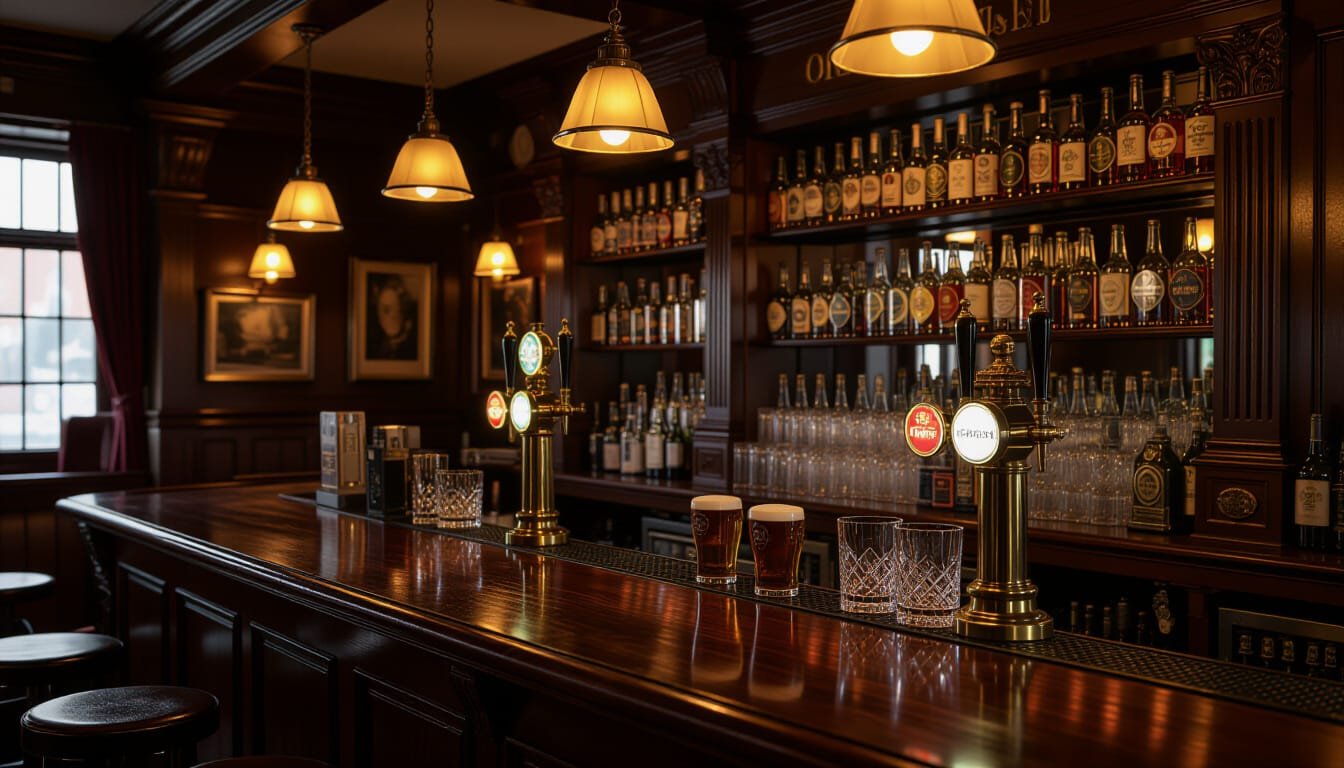There’s a moment… a tiny, easily missed flicker of transition… when you walk into a British pub and feel the world slip into a lower gear. The air shifts. Your posture loosens. Some internal dial turns down a notch, as if your nervous system recognises something ancient and familiar.
Perhaps it’s the lighting… dim enough to soothe, bright enough to avoid tripping over a barstool.
Perhaps it’s the smell… that uniquely British blend of ale, wood varnish, fryer oil, and the faint historical memory of cigarettes from the days before the smoking ban.
Whatever it is, a pub has an uncanny ability to make you feel like you’ve stepped into a parallel version of your day. Not an escape exactly… more like a pause. A wet-floored, wood-scented, laughter-soaked intermission.
The Scents, the Sounds, the Souls
Craft ales sit half-drunk on the bar, sending up warm, fruity aromas as bar towels beneath them quietly absorb the latest casualties. These towels could probably tell more stories than the patrons… heavy with decades of overspills, clumsy rounds, and unspoken truths.
The “barflies” lean on their usual patch of wood like guardians of some invisible border. There’s always a handful: the old boy who speaks in warnings, the stoic one who hasn’t smiled since 1994, the friendly pessimist who offers advice that sounds like prophecy delivered through a pint glass. They are fixtures, as much a part of the place as the sticky carpet and the chalkboard menu that hasn’t been updated since the early 2000s.
Ask them why they always stand there and they’ll lift one shoulder and mumble something noncommittal, but the real reason is simpler: humans gravitate towards familiarity, especially in a world that feels increasingly unfamiliar.
Behind the bar, staff move with a kind of rehearsed caution… the stance of people who know the crowd can shift from calm to chaos in the time it takes to pour a Guinness. They mentally brace for sudden influxes: a football crowd, a hen party, five old mates in matching polyester jackets, or a bus tour of tourists who will absolutely ask what “bangers and mash” is.
And through the partially opened kitchen door, you catch glimpses of the chef. Red-faced. Sweating. Fighting an existential battle against the fryer. There’s something poetic about watching a man in a tiny kitchen plating up Sunday roasts while quietly reconsidering every life choice that led him here… a ritual punctuated by disappearing out back for a fag and a moment of cosmic reflection.
The Theology of ‘Just One’
Then come the wanderers… the people who proclaim the most famous British lie: “I’m just popping in for one.”
Bless them.
Bless us.
It’s a play we’re all in, and every one of us knows the script.
The first pint is to unwind.
The second is because the first went down surprisingly smoothly.
The third is where philosophical clarity emerges… the kind where two strangers can solve the entire geopolitical landscape of the world if given twenty uninterrupted minutes and a beer mat to jot diagrams on.
There’s something deeply human about the ritual of “one turning into three.” It’s not indulgence. It’s not avoidance. It’s the slow exhale of people who, for a moment, don’t want to be defined by their to-do lists, inboxes, or responsibilities waiting at home like unpaid tax letters.
The pub is where people come to decompress from the weight of being alive.
A Place That Holds You, Even From a Distance
Some people sit alone. Some sit in groups. Some hover somewhere in between. But here’s the part people often miss: a pub is one of the last places where you can be alone around others… a kind of emotional halfway house that makes solitude feel less like isolation and more like quiet belonging.
No one needs to talk to you.
You don’t need to perform.
You don’t need to announce your presence.
You simply exist in the shared hum of life unfolding around you. It’s comforting. Odd. Beautiful in a small, unassuming way.
In a society drowning in digital noise… metrics, updates, endless scrolling… the pub offers a kind of analogue mercy. A space where the most important notification is the bartender shouting, “Who’s next?”
Where being present is easier because there’s nothing demanding that you be elsewhere.
Why Pubs Matter More Than We Admit
People say pubs are dying. That the culture is fading. That the younger generations don’t appreciate it. But maybe that’s only half the story. Because something deeper is happening inside these old wooden walls: a kind of social maintenance work that we don’t always recognise until it’s gone.
Pubs are where communities quietly stay intact.
Where loneliness is kept at bay.
Where connection doesn’t require an app or an algorithm.
Where the human condition is served in small, manageable doses.
It is a sanctuary for the tired, the curious, the lost, the hopeful, the thirsty.
It’s a reminder that life is better lived within arm’s reach of others… even if we never exchange a word.
Leaving a Little Lighter
And then there’s the exit… that moment when you push open the door and feel the night air wash over your face. The world looks the same as it did when you walked in, but something in you has shifted. Softened. Stabilised. As if you’ve been gently reset by the presence of strangers, decent lighting, and a pint poured with care.
You step back into the world not solved, not fixed, but somehow steadier.
And that, perhaps, is the quiet genius of the British pub.
Not the beer.
Not the snacks.
Not even the atmosphere.
But the simple, unadorned truth:
We gather separately… and somehow leave a little more whole.
Until Next Time

Discover more from Dominus Owen Markham
Subscribe to get the latest posts sent to your email.

